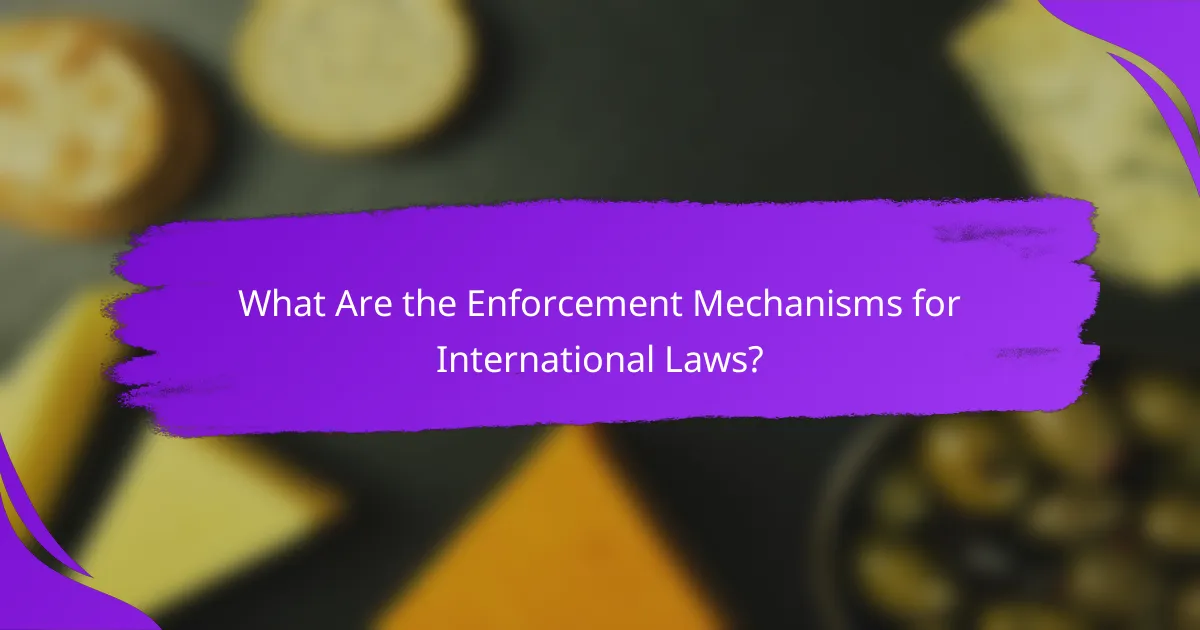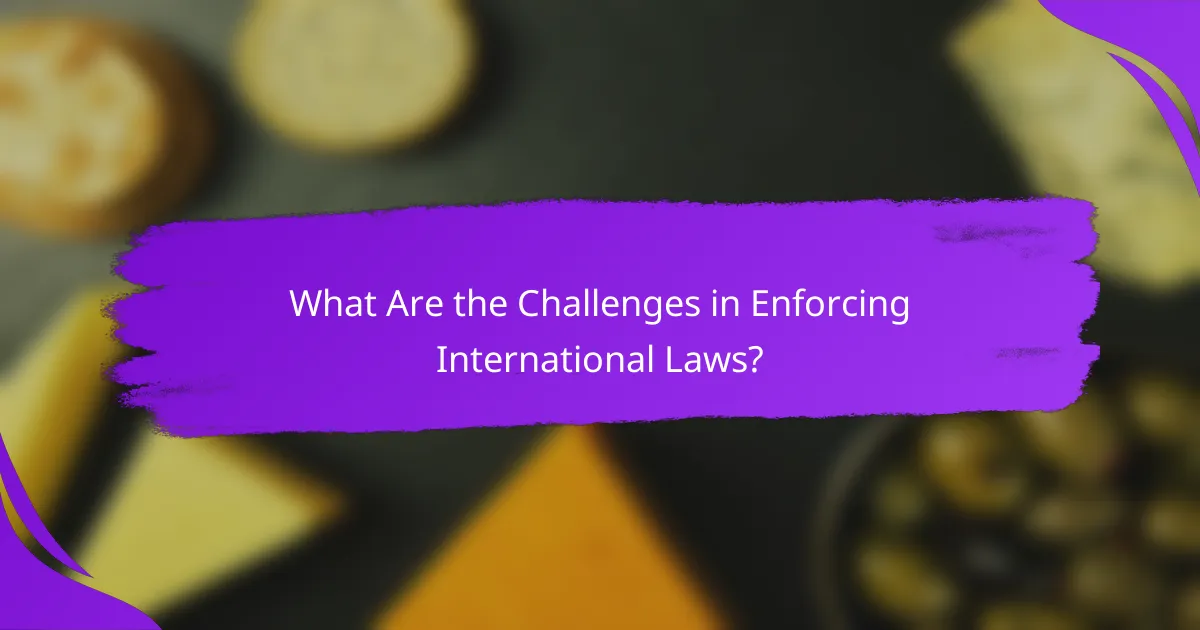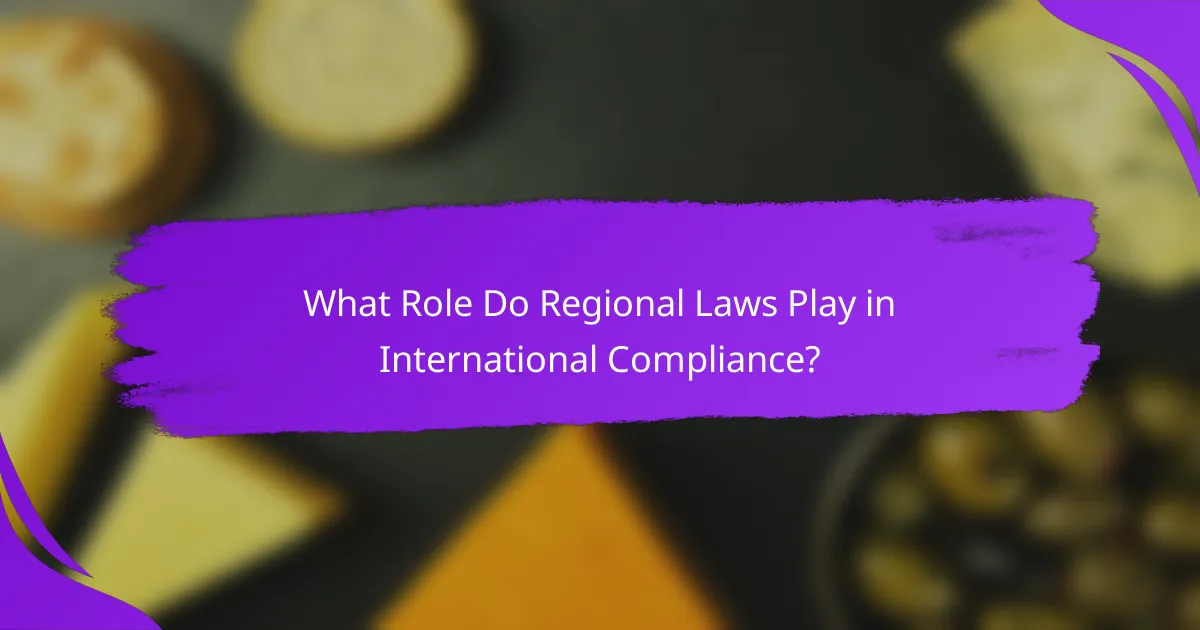International laws play a crucial role in fostering cooperation and establishing standards among nations. They are promoted through treaties, trade agreements, and global organizations, while enforcement mechanisms such as international courts and sanctions ensure compliance and accountability. Businesses also contribute to this framework by implementing structured processes to navigate legal complexities and mitigate risks associated with non-compliance.

How Are International Laws Promoted?
International laws are promoted through various mechanisms that enhance their visibility and acceptance among nations. These mechanisms include treaties, trade agreements, global organizations, and public awareness campaigns that collectively work to establish norms and standards across borders.
International treaties
International treaties are formal agreements between countries that establish legal obligations. They often cover a wide range of issues, such as human rights, environmental protection, and trade regulations. For example, the Paris Agreement is a treaty aimed at combating climate change by setting emission reduction targets for participating countries.
Countries typically negotiate treaties through diplomatic channels, and once agreed upon, they must ratify them according to their national laws. This process ensures that the treaty becomes legally binding within the participating states.
Trade agreements
Trade agreements facilitate international commerce by reducing tariffs and establishing trade rules between countries. These agreements can promote compliance with international laws by integrating legal standards into trade practices. For instance, the North American Free Trade Agreement (NAFTA) included provisions that required member countries to adhere to certain labor and environmental standards.
Countries often use trade agreements as a tool to encourage compliance with international laws, as adherence can lead to enhanced trade relations and economic benefits. However, the negotiation process can be complex and may require compromises on various legal standards.
Global organizations
Global organizations, such as the United Nations (UN) and the World Trade Organization (WTO), play a crucial role in promoting international laws. They provide a platform for dialogue, establish norms, and monitor compliance among member states. The UN, for example, develops international legal frameworks through conventions and resolutions that member countries are encouraged to adopt.
These organizations often facilitate capacity-building initiatives, helping countries implement international laws effectively. They may also impose sanctions or other measures on nations that fail to comply with established legal standards.
Public awareness campaigns
Public awareness campaigns are essential for promoting international laws by educating citizens about their rights and responsibilities. These campaigns can take various forms, including social media initiatives, educational programs, and community outreach efforts. For example, campaigns focused on human rights often aim to inform the public about international treaties that protect these rights.
Effective public awareness campaigns can mobilize support for international laws and encourage compliance at the grassroots level. Engaging the public fosters a culture of accountability and can pressure governments to uphold their international commitments.

What Are the Enforcement Mechanisms for International Laws?
Enforcement mechanisms for international laws are essential for ensuring compliance and accountability among nations. These mechanisms include international courts, sanctions, and monitoring bodies that work together to uphold legal standards and norms.
International courts
International courts, such as the International Court of Justice (ICJ) and the International Criminal Court (ICC), play a crucial role in enforcing international laws. They adjudicate disputes between states and prosecute individuals for crimes like genocide and war crimes. Countries must accept the jurisdiction of these courts to be held accountable.
For effective enforcement, nations often need to cooperate with court rulings, which can involve complex diplomatic negotiations. Compliance can vary significantly, with some states adhering to decisions while others may resist or ignore them.
Sanctions and penalties
Sanctions and penalties are tools used by countries or international organizations to enforce compliance with international laws. These can include economic sanctions, trade restrictions, or diplomatic isolation aimed at deterring unlawful behavior. For instance, the United Nations may impose sanctions on a country violating human rights or engaging in aggression.
While sanctions can be effective, they can also have unintended consequences, such as harming civilian populations. It is essential to carefully consider the potential impacts and ensure that sanctions are targeted and proportionate to the violations committed.
Monitoring bodies
Monitoring bodies, such as the United Nations Human Rights Council and various treaty organizations, are responsible for overseeing compliance with international laws and treaties. They gather information, conduct investigations, and report on the adherence of states to their obligations. These bodies often rely on member states to provide data and facilitate assessments.
Effective monitoring can lead to increased transparency and accountability. However, the success of these bodies often hinges on the political will of member states to cooperate and implement recommendations made in reports. Regular engagement and dialogue are crucial for fostering compliance and addressing violations promptly.

How Do Businesses Ensure Compliance with International Laws?
Businesses ensure compliance with international laws by implementing structured processes that include regular assessments, employee training, and expert consultations. These measures help organizations navigate complex legal landscapes and mitigate risks associated with non-compliance.
Legal audits
Legal audits are systematic evaluations of a company’s adherence to international laws and regulations. These audits typically involve reviewing policies, practices, and documentation to identify potential compliance gaps.
Conducting regular legal audits can help businesses stay updated on changing laws and regulations. Companies often schedule these audits annually or biannually, depending on their size and industry complexity.
Compliance training programs
Compliance training programs educate employees about relevant international laws and internal policies. These programs are essential for fostering a culture of compliance and ensuring that staff understand their responsibilities.
Effective training should be tailored to specific roles within the organization and updated regularly to reflect new legal developments. Businesses might consider offering training sessions quarterly or biannually to reinforce knowledge and address any changes in regulations.
Consultation with legal experts
Consulting with legal experts is crucial for businesses navigating international laws. Legal professionals provide insights into complex regulations and help develop compliance strategies tailored to the organization’s needs.
Engaging legal experts can be particularly beneficial when entering new markets or dealing with intricate legal frameworks. Companies should consider establishing ongoing relationships with legal advisors to ensure continuous support and guidance.

What Are the Challenges in Enforcing International Laws?
Enforcing international laws faces several significant challenges, including jurisdictional issues, political resistance, and resource limitations. These factors can hinder the effectiveness of legal frameworks designed to promote global cooperation and compliance.
Jurisdictional issues
Jurisdictional issues arise when determining which legal authority has the right to enforce international laws. Different countries may have conflicting laws or may not recognize the authority of international courts, leading to complications in enforcement. For example, a crime committed in one nation may not be prosecuted if the accused flees to another country that does not honor extradition treaties.
To navigate these challenges, nations often rely on bilateral or multilateral agreements that clarify jurisdictional authority. However, the effectiveness of these agreements can vary significantly based on the political climate and the willingness of states to cooperate.
Political resistance
Political resistance is a major barrier to the enforcement of international laws. Governments may prioritize national interests over international obligations, leading to reluctance in complying with or enforcing laws that conflict with domestic policies. For instance, a country may refuse to implement sanctions against another state due to economic ties or political alliances.
Addressing political resistance often requires diplomatic efforts and negotiations to align national interests with international legal standards. Building coalitions with like-minded countries can also enhance the pressure on resistant states to comply with international norms.
Resource limitations
Resource limitations significantly impact the enforcement of international laws, as many countries lack the financial or human resources necessary for effective implementation. Developing nations, in particular, may struggle to allocate funds for legal systems, law enforcement, and compliance monitoring.
To mitigate these limitations, international organizations often provide technical assistance and funding to support capacity-building initiatives. Countries can also explore partnerships with NGOs and private sectors to enhance their enforcement capabilities without overextending their budgets.

What Role Do Regional Laws Play in International Compliance?
Regional laws significantly influence international compliance by establishing frameworks that facilitate trade and cooperation among countries. These laws help harmonize regulations, making it easier for nations to adhere to international standards and agreements.
Regional trade agreements
Regional trade agreements (RTAs) are treaties between countries in a specific region aimed at reducing trade barriers and enhancing economic cooperation. Examples include the North American Free Trade Agreement (NAFTA) and the European Union (EU) regulations, which set common standards for member states.
RTAs often include provisions for compliance with international laws, requiring member countries to align their domestic regulations with agreed-upon standards. This alignment can streamline processes for businesses operating across borders, reducing costs and increasing efficiency.
Harmonization of laws
The harmonization of laws refers to the process of aligning national laws with international standards to promote consistency and predictability in legal frameworks. This is crucial for international compliance, as it reduces discrepancies that can lead to legal disputes.
Countries may adopt model laws or guidelines set by international organizations, such as the World Trade Organization (WTO), to achieve harmonization. This approach not only facilitates smoother trade but also enhances legal certainty for businesses engaged in cross-border activities.

How Do Emerging Technologies Impact International Law Compliance?
Emerging technologies significantly influence international law compliance by reshaping legal frameworks and enforcement mechanisms. Innovations such as artificial intelligence, blockchain, and data analytics present both opportunities and challenges for adherence to international regulations.
Artificial Intelligence and Compliance
Artificial intelligence (AI) can enhance compliance monitoring by automating data analysis and flagging potential violations. For instance, AI systems can process vast amounts of data to identify patterns that suggest non-compliance with international standards.
However, reliance on AI raises concerns about accountability and transparency. Organizations must ensure that AI tools are designed to align with legal requirements and ethical standards to mitigate risks associated with biased algorithms.
Blockchain Technology’s Role
Blockchain technology offers a decentralized and secure method for recording transactions, which can improve compliance in areas like trade and finance. By providing an immutable ledger, blockchain enhances transparency and traceability, making it easier for entities to demonstrate adherence to international laws.
Despite its benefits, the implementation of blockchain must consider regulatory frameworks across different jurisdictions. Companies should engage with legal experts to navigate the complexities of cross-border compliance when utilizing blockchain solutions.
Data Privacy and Security Considerations
Emerging technologies often involve the collection and processing of personal data, raising significant data privacy and security issues. Compliance with international regulations such as the General Data Protection Regulation (GDPR) in Europe is crucial for organizations operating globally.
To ensure compliance, businesses should conduct regular audits of their data handling practices and implement robust security measures. This includes training staff on data protection and establishing clear protocols for data access and sharing.


